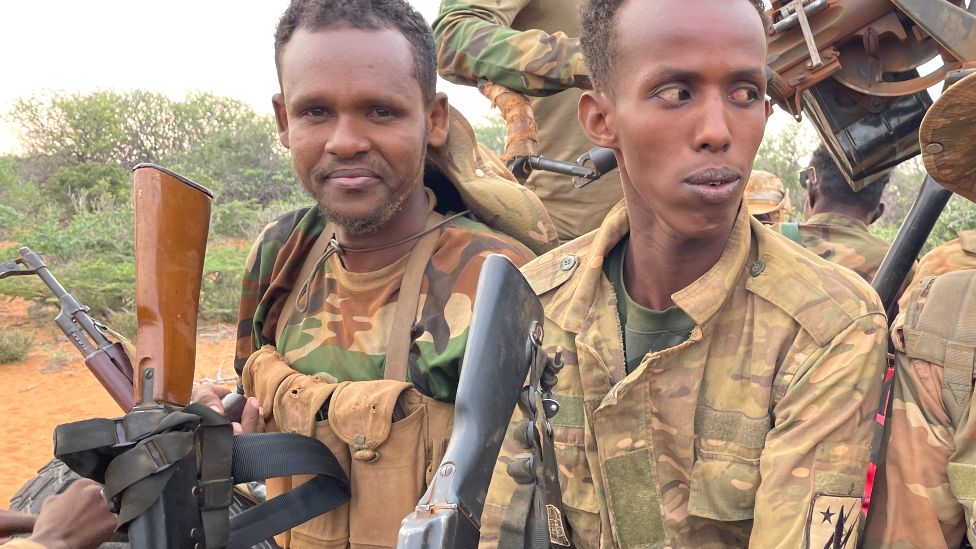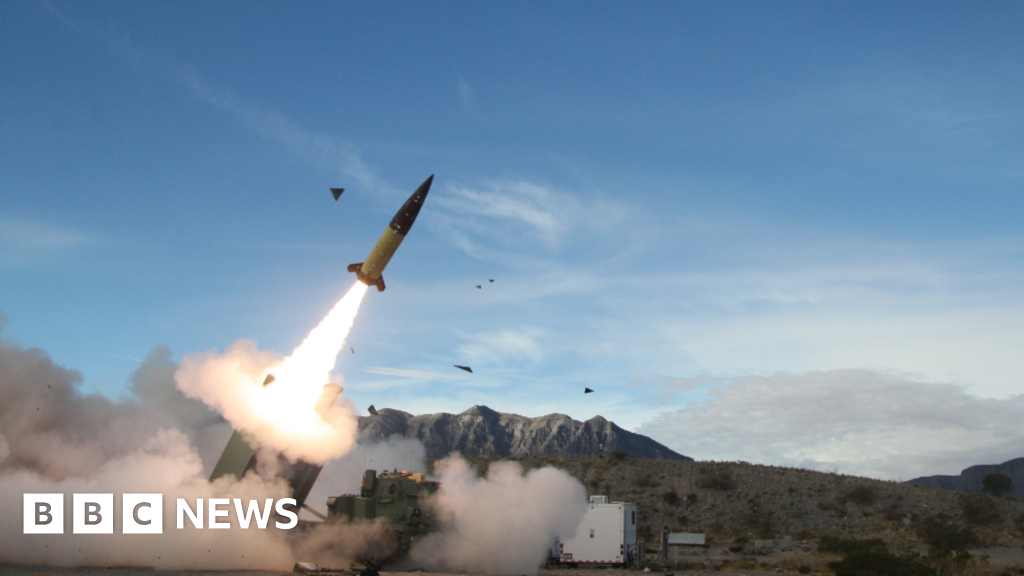ARTICLE AD BOX

By Andrew Harding
BBC News, Bukure
It is just after five in the morning, and three pickup trucks - each bristling, like porcupines, with a dozen heavily armed soldiers - are tearing along a winding, sandy track in the dawn-grey wilderness of central Somalia.
The driver of the middle car, hunched forward over his wheel, changes down a gear to skid round a thorn bush, then flashes a smile and checks his wing-mirror to make sure none of his colleagues, feet dangling over the sides of the vehicle, have fallen off.
"Our job is to go in first," says a young lieutenant, sitting in the passenger seat and scanning the countryside ahead for signs of a possible ambush, or for the improvised explosive devices so often used by the militant group, al-Shabab.
Over the last three months these elite national army troops, members of the American-funded and trained Danab - meaning "lightning" - commando brigade, have played a central role in a broader uprising against al-Shabab which has seen the militants forced out of dozens of towns and villages in the centre of Somalia.
The unanticipated success of this unexpected offensive has triggered a wave of optimism across the country, even while millions grapple with a devastating drought.
"This is the most optimistic I've felt in years. There is nothing that can stop these operations because we have tasted victory against al-Shabab. We've seen that they can be beaten, and the Somali people are finally awake," said Malik Abdalla, a local MP in the Hiran region where much of the fighting has taken place.
Furious spite
After three hours of hard driving, and one blown tyre, the convoy reaches the outskirts of a small town named Bukure, and the soldiers of Danab's Sixth Battalion slip off their vehicles.
Danab soldiers are always on the look out for militant ambushes
They are lean, confident men, at ease with their weapons and used to travelling light. Without a word, they fan out protectively around us - a team of three BBC journalists granted rare access to the platoon and the conflict zone.
"Word spreads fast. Al-Shabab will already know you're here. That's why we had to leave camp so early this morning, to get on the road before they could plant ambushes," said Asli Halane, a civil-military liaison officer and the only member of the highly secretive platoon authorised to speak to us on the record.
Three soldiers remain on the vehicles, peering through the sights of the formidable DShK heavy machine guns mounted on the back of each pickup, as local civilians, many of them nomadic pastoralists, slowly emerged from the surrounding countryside.
"We managed to kill 60 al-Shabab fighters here," said Sergeant Halane, walking past the burnt remains of several small shops, and recounting the day-long battle for the town in September.
Several hundred militants eventually withdrew from Bukure, but not before they had set fire to many buildings, and used explosives to destroy the town's concrete water tower in an act interpreted by locals as furious spite.
Before they withdrew, militants used fire and explosives to gut Bukure
A local shopkeeper, Khadra Farah, described how a retreating militant shot at her after burning her store.
The community was left with no water or food for many days, and "they still don't have basic needs. Things are really bad here", says Sgt Halane.
'We slept afraid'
And yet, the mood in Bukure, and in many other parts of Somalia, is not the familiar, fearful despondency one encounters so often in a country that has failed, so many times over so many years, to rid itself of the al-Qaeda-linked group.
People suffering from the devastating drought are fed up of al-Shabab taxes
Instead, in a rare display of public defiance, dozens of civilians agreed to be filmed by us, openly declaring their hatred of al-Shabab, and their belief that something fundamental had changed.
"Under al-Shabab we slept afraid every night," said Ali Dahir Warsame, 48, a local community leader.
"But we understand now that they have nothing to do with Islam. They have been harming innocent people. Now we're 100% confident that they won't come back here."
Part of the explanation lies in Somalia's current drought - the worst in four decades - which has pushed many communities to the brink of starvation, and left people feeling they have no option but to rebel against a militant group with a hard-earned reputation for extorting bribes and collecting punitive taxes.
But another reason is the nature of the uprising itself, which has the fluid, organic feel of a grass-roots revolution, led by local farmers and clans, with the government, the army and special forces often acting in a supporting role.
"This is a turning point. People are really fed up with al-Shabab. If the government can [take] advantage of this opportunity I think al-Shabab will be dislodged," said Mohamed Moalimu, a former journalist turned MP who has survived numerous militant attacks and has spent weeks visiting members of the "ma'awiisley" clan militias who have done much of the fighting in Hiran region.
The Danab Brigade is US-funded and trained - and its numbers are set to rise
And yet, the question lingers - can a popular uprising overcome the deeply embedded clan divisions that have helped condemn Somalia to three decades of conflict and anarchy?
Already there are signs that powerful leaders in some parts of the country's cumbersome federal system are hedging their bets, sceptical about the central government's commitment and competence, and reluctant to back a rebellion that could yet fizzle out, leaving them more exposed to the militants.
"The strategy is working," insisted Hussein Sheikh-Ali, national security adviser to Somalia's president, predicting that wavering politicians would soon find themselves obliged to support the uprising.
"Because anti-al-Shabab sentiment is so popular, politicians cannot be seen to be obstructing or challenging the federal government," said Mr Sheikh-Ali.
'Good guys'
The combination of drought and conflict has certainly pushed Somalia into uncertain territory and presented the central government with a rare opportunity to challenge the militants' stranglehold on large chunks of the countryside.
The commandos say al-Shabab fighters now do not want to take them on
The Danab battalion is expected to grow from around 1,500 soldiers to more than double that in the coming months, with the US providing more funding, and more military support.
"The US? They're the good guys. They helped us with drones [in the battle for Bukure]. I've fought more than six battles against al-Shabab, and now, when they see we want to fight, they run," said one of the Danab platoon's senior officers, speaking on condition of anonymity.
But he was more circumspect about the broader uprising against the militants, worried that it could still fracture into a messier conflict "between the clans".
And with that, the Danab convoy set off again, at its usual furious pace, first, to drop us at an airstrip four hours away through the bush, and then to turn south, heading towards the Shabelle River and the main road to the capital, Mogadishu, where another battle against al-Shabab was already under way.
More on al-Shabab and the drought:

 1 year ago
23
1 year ago
23








 English (US)
English (US)